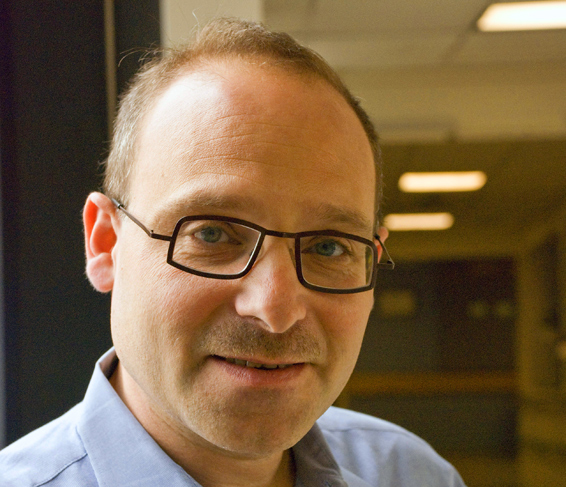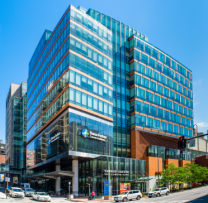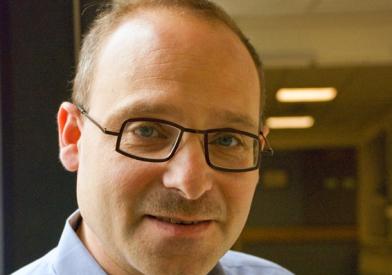
David S. Pellman, MD
Contact Information
Office Phone Number
Fax
Biography
David S. Pellman, MD
Dr. Pellman received his MD in 1986 from the University of Chicago, Pritzker School of Medicine, and did postgraduate training in pediatrics and pediatric hematology-oncology at DFCI and Children's Hospital, Boston. He was a postdoctoral fellow at the Whitehead Institute for Biomedical Research at Massachusetts Institute of Technology. In 1995, he joined DFCI, and is currently the Margaret M. Dyson Professor of Pediatric Oncology, Professor of Cell Biology, Harvard Medical School. In 2008, he was appointed as an Investigator of the Howard Hughes Medical Institute.
Researcher
Physician
Recent Awards
- Stohlman Scholar, Leukemia and Lymphoma Society 2005
-
Damon Runyon Scholar Award
1996
- Kimmel Scholar Award 1998
- Graduate Student Mentoring Award, Harvard Medical School 1999
- Scholar Award, Leukemia & Lymphoma Society 2000
- American Society for Clinical Investigation 2001
- BASF Bioresearch Award, DFCI 2001
-
HHMI, Investigator
2008
-
Association of American Physicians
2010
-
AAAS Fellow, Medical Sciences
2012
-
Alpha Omega Alpha Research Fellowship
1986
-
Catherine Dobson Prize for Research; University of Chicago, Pritzker School of Medicine
1986
-
St. Jude's Children's Hospital Fellow in the Pediatric Scientist Training Program
1989
-
NIH Clinical Investigator Award
1992
-
Claudia Adams Barr Investigator, DFCI
1994
-
E. Mead Johnson Award, Society of Pediatric Research
2006
-
American Pediatric Society (APS)
2008
Research
Cell Division and Genome Stability
Our laboratory aims to understand normal cell division mechanisms and to discover cell division defects that are unique to cancer cell. We take a range of approaches including genetics, functional genomics, biochemistry and live cell imaging. There are ongoing projects using yeast, tissue culture cells, and genetically engineered mice.
Our work on cytoskeletal dynamics is focused on the mechanism of chromosome segregation in normal cells and cancer cells. We are particularly interested in how the microtubule and actin cytoskeletons interact and how cell cycle signals remodel these cytoskeletal systems. For example, we have recently uncovered a mechanism by which actin organization and the adhesive microenvironment of cells influence chromosome segregation. We study how centrosome amplification in cancer cells impacts cellular adhesion, cell migration, and tumor invasion. We have discovered new drug targets that kill cancer cells because of their centrosome amplification. We have defined cytoskeletal mechanisms that control polarized cell growth, asymmetric cell division, and cytokinesis. We use biochemical and imaging approaches to understand these processes at a mechanistic level.
We are also interested in how aneuploidy (abnormal chromosome number) and polyploidy (increased sets of chromosomes) impact on tumor biology. We have developed new methods to generate human cells with specific cancer-associated trisomies and are studying how these trisomies impact tumorigenesis. We discovered that failure of cytokinesis, which doubles the number of chromosomes and centrosomes, promotes tumorigenesis, using a mouse breast cancer model. We recently identified a mechanism by which errors in mitosis cause DNA breaks. These findings may explain the recently discovered phenomenon of chromothripsis, where a single chromosome or chromosome arm appears to undergo massive breakage and rearrangement.
Research Website
https://pellmanlab.dana-farber.orgPublications
-
Heritable transcriptional defects from aberrations of nuclear architecture. Nature. 2023 Jul; 619(7968):184-192. View in: Pubmed
-
Author Correction: Comprehensive analysis of chromothripsis in 2,658 human cancers using whole-genome sequencing. Nat Genet. 2023 Jun; 55(6):1076. View in: Pubmed
-
ERa-associated translocations underlie oncogene amplifications in breast cancer. Nature. 2023 Jun; 618(7967):1024-1032. View in: Pubmed
-
Publisher Correction: Comprehensive analysis of chromothripsis in 2,658 human cancers using whole-genome sequencing. Nat Genet. 2023 May; 55(5):893. View in: Pubmed
-
A tubule-sheet continuum model for the mechanism of nuclear envelope assembly. Dev Cell. 2023 05 22; 58(10):847-865.e10. View in: Pubmed
-
Breakage of cytoplasmic chromosomes by pathological DNA base excision repair. Nature. 2022 06; 606(7916):930-936. View in: Pubmed
-
Decoding complex patterns of oncogene amplification. Nat Genet. 2021 12; 53(12):1626-1627. View in: Pubmed
-
Whole chromosome loss and genomic instability in mouse embryos after CRISPR-Cas9 genome editing. Nat Commun. 2021 10 06; 12(1):5855. View in: Pubmed
-
Chromothripsis as an on-target consequence of CRISPR-Cas9 genome editing. Nat Genet. 2021 06; 53(6):895-905. View in: Pubmed
-
Angelika Amon (1967-2020). Nat Cell Biol. 2021 Jan; 23(1):1-2. View in: Pubmed
-
The Ubiquitin Ligase TRAIP: Double-Edged Sword at the Replisome. Trends Cell Biol. 2021 02; 31(2):75-85. View in: Pubmed
-
The coordination of nuclear envelope assembly and chromosome segregation in metazoans. Nucleus. 2020 12; 11(1):35-52. View in: Pubmed
-
Factors promoting nuclear envelope assembly independent of the canonical ESCRT pathway. J Cell Biol. 2020 06 01; 219(6). View in: Pubmed
-
Acquired resistance to combined BET and CDK4/6 inhibition in triple-negative breast cancer. Nat Commun. 2020 05 11; 11(1):2350. View in: Pubmed
-
Mechanisms generating cancer genome complexity from a single cell division error. Science. 2020 04 17; 368(6488). View in: Pubmed
-
Comprehensive analysis of chromothripsis in 2,658 human cancers using whole-genome sequencing. Nat Genet. 2020 03; 52(3):331-341. View in: Pubmed
-
Mitotic CDK Promotes Replisome Disassembly, Fork Breakage, and Complex DNA Rearrangements. Mol Cell. 2019 03 07; 73(5):915-929.e6. View in: Pubmed
-
Human nuclear RNAi-defective 2 (NRDE2) is an essential RNA splicing factor. RNA. 2019 03; 25(3):352-363. View in: Pubmed
-
Trisomy of a Down Syndrome Critical Region Globally Amplifies Transcription via HMGN1 Overexpression. Cell Rep. 2018 11 13; 25(7):1898-1911.e5. View in: Pubmed
-
TRPS1 Is a Lineage-Specific Transcriptional Dependency in Breast Cancer. Cell Rep. 2018 10 30; 25(5):1255-1267.e5. View in: Pubmed
-
Cells Lacking the RB1 Tumor Suppressor Gene Are Hyperdependent on Aurora B Kinase for Survival. Cancer Discov. 2019 02; 9(2):230-247. View in: Pubmed
-
Nuclear envelope assembly defects link mitotic errors to chromothripsis. Nature. 2018 09; 561(7724):551-555. View in: Pubmed
-
How the Genome Folds, Divides, Lives, and Dies. Cold Spring Harb Symp Quant Biol. 2017; 82:349-360. View in: Pubmed
-
Over-elongation of centrioles in cancer promotes centriole amplification and chromosome missegregation. Nat Commun. 2018 03 28; 9(1):1258. View in: Pubmed
-
Cell Biology: When Your Own Chromosomes Act like Foreign DNA. Curr Biol. 2017 11 20; 27(22):R1228-R1231. View in: Pubmed
-
Cancer biology: Genome jail-break triggers lockdown. Nature. 2017 10 19; 550(7676):340-341. View in: Pubmed
-
A Tubulin Binding Switch Underlies Kip3/Kinesin-8 Depolymerase Activity. Dev Cell. 2017 07 10; 42(1):37-51.e8. View in: Pubmed
-
The EMT regulator ZEB2 is a novel dependency of human and murine acute myeloid leukemia. Blood. 2017 01 26; 129(4):497-508. View in: Pubmed
-
From Mutational Mechanisms in Single Cells to Mutational Patterns in Cancer Genomes. Cold Spring Harb Symp Quant Biol. 2015; 80:117-37. View in: Pubmed
-
Modeling the initiation of Ewing sarcoma tumorigenesis in differentiating human embryonic stem cells. Oncogene. 2016 06 16; 35(24):3092-102. View in: Pubmed
-
Chromothripsis: A New Mechanism for Rapid Karyotype Evolution. Annu Rev Genet. 2015; 49:183-211. View in: Pubmed
-
Direct Microtubule-Binding by Myosin-10 Orients Centrosomes toward Retraction Fibers and Subcortical Actin Clouds. Dev Cell. 2015 Aug 10; 34(3):323-37. View in: Pubmed
-
Chromothripsis from DNA damage in micronuclei. Nature. 2015 Jun 11; 522(7555):179-84. View in: Pubmed
-
Polyploidy can drive rapid adaptation in yeast. Nature. 2015 Mar 19; 519(7543):349-52. View in: Pubmed
-
Erratum: Parallel genome-scale loss of function screens in 216 cancer cell lines for the identification of context-specific genetic dependencies. Sci Data. 2014; 1:140044. View in: Pubmed
-
Parallel genome-scale loss of function screens in 216 cancer cell lines for the identification of context-specific genetic dependencies. Sci Data. 2014; 1:140035. View in: Pubmed
-
Aurea mediocritas: the importance of a balanced genome. Cold Spring Harb Perspect Biol. 2014 Sep 18; 6(11):a015842. View in: Pubmed
-
Causes and consequences of centrosome abnormalities in cancer. Philos Trans R Soc Lond B Biol Sci. 2014 Sep 05; 369(1650). View in: Pubmed
-
Cytokinesis failure triggers hippo tumor suppressor pathway activation. Cell. 2014 Aug 14; 158(4):833-848. View in: Pubmed
-
Triplication of a 21q22 region contributes to B cell transformation through HMGN1 overexpression and loss of histone H3 Lys27 trimethylation. Nat Genet. 2014 Jun; 46(6):618-23. View in: Pubmed
-
Oncogene-like induction of cellular invasion from centrosome amplification. Nature. 2014 Jun 05; 510(7503):167-71. View in: Pubmed
-
Dephosphorylation enables the recruitment of 53BP1 to double-strand DNA breaks. Mol Cell. 2014 May 08; 54(3):512-25. View in: Pubmed
-
Chromothripsis and beyond: rapid genome evolution from complex chromosomal rearrangements. Genes Dev. 2013 Dec 01; 27(23):2513-30. View in: Pubmed
-
Inhibition of Cdc42 during mitotic exit is required for cytokinesis. J Cell Biol. 2013 Jul 22; 202(2):231-40. View in: Pubmed
-
Microtubule-sliding activity of a kinesin-8 promotes spindle assembly and spindle-length control. Nat Cell Biol. 2013 Aug; 15(8):948-57. View in: Pubmed
-
Linking abnormal mitosis to the acquisition of DNA damage. J Cell Biol. 2012 Dec 10; 199(6):871-81. View in: Pubmed
-
Move in for the kill: motile microtubule regulators. Trends Cell Biol. 2012 Nov; 22(11):567-75. View in: Pubmed
-
Regulation of the formin Bnr1 by septins anda MARK/Par1-family septin-associated kinase. Mol Biol Cell. 2012 Oct; 23(20):4041-53. View in: Pubmed
-
Proteasomal degradation resolves competition between cell polarization and cellular wound healing. Cell. 2012 Jul 06; 150(1):151-64. View in: Pubmed
-
"Two" much of a good thing: telomere damage-induced genome doubling drives tumorigenesis. Cancer Cell. 2012 Jun 12; 21(6):712-4. View in: Pubmed
-
Absolute quantification of somatic DNA alterations in human cancer. Nat Biotechnol. 2012 May; 30(5):413-21. View in: Pubmed
-
Causes and consequences of aneuploidy in cancer. Nat Rev Genet. 2012 Jan 24; 13(3):189-203. View in: Pubmed
-
DNA breaks and chromosome pulverization from errors in mitosis. Nature. 2012 Jan 18; 482(7383):53-8. View in: Pubmed
-
Mechanisms underlying the dual-mode regulation of microtubule dynamics by Kip3/kinesin-8. Mol Cell. 2011 Sep 02; 43(5):751-63. View in: Pubmed
-
Centrosomes and cilia in human disease. Trends Genet. 2011 Aug; 27(8):307-15. View in: Pubmed
-
Bub1, Sgo1, and Mps1 mediate a distinct pathway for chromosome biorientation in budding yeast. Mol Biol Cell. 2011 May; 22(9):1473-85. View in: Pubmed
-
Cancer genomes evolve by pulverizing single chromosomes. Cell. 2011 Jan 07; 144(1):9-10. View in: Pubmed
-
HURP permits MTOC sorting for robust meiotic spindle bipolarity, similar to extra centrosome clustering in cancer cells. J Cell Biol. 2010 Dec 27; 191(7):1251-60. View in: Pubmed
-
Cytokinesis failure occurs in Fanconi anemia pathway-deficient murine and human bone marrow hematopoietic cells. J Clin Invest. 2010 Nov; 120(11):3834-42. View in: Pubmed
-
David Pellman: Grasping the geometry of cancer. Interviewed by Caitlin Sedwick. J Cell Biol. 2010 Jul 12; 190(1):4-5. View in: Pubmed
-
Small-molecule kinase inhibitors provide insight into Mps1 cell cycle function. Nat Chem Biol. 2010 May; 6(5):359-68. View in: Pubmed
-
Human TUBB3 mutations perturb microtubule dynamics, kinesin interactions, and axon guidance. Cell. 2010 Jan 08; 140(1):74-87. View in: Pubmed
-
Emi1 maintains genomic integrity during zebrafish embryogenesis and cooperates with p53 in tumor suppression. Mol Cell Biol. 2009 Nov; 29(21):5911-22. View in: Pubmed
-
A mechanism linking extra centrosomes to chromosomal instability. Nature. 2009 Jul 09; 460(7252):278-82. View in: Pubmed
-
Centrosomes and cancer: how cancer cells divide with too many centrosomes. Cancer Metastasis Rev. 2009 Jun; 28(1-2):85-98. View in: Pubmed
-
Mechanisms for concentrating Rho1 during cytokinesis. Genes Dev. 2009 Apr 01; 23(7):810-23. View in: Pubmed
-
A little CIN may cost a lot: revisiting aneuploidy and cancer. Curr Opin Genet Dev. 2009 Feb; 19(1):74-81. View in: Pubmed
-
Symmetry breaking: scaffold plays matchmaker for polarity signaling proteins. Curr Biol. 2008 Dec 23; 18(24):R1130-2. View in: Pubmed
-
Mechanisms to suppress multipolar divisions in cancer cells with extra centrosomes. Genes Dev. 2008 Aug 15; 22(16):2189-203. View in: Pubmed
-
Mitotic spindle destabilization and genomic instability in Shwachman-Diamond syndrome. J Clin Invest. 2008 Apr; 118(4):1511-8. View in: Pubmed
-
G1/S cyclin-dependent kinase regulates small GTPase Rho1p through phosphorylation of RhoGEF Tus1p in Saccharomyces cerevisiae. Mol Biol Cell. 2008 Apr; 19(4):1763-71. View in: Pubmed
-
Plugging the GAP between cell polarity and cell cycle. EMBO Rep. 2008 Jan; 9(1):39-41. View in: Pubmed
-
Limiting the proliferation of polyploid cells. Cell. 2007 Nov 02; 131(3):437-40. View in: Pubmed
-
APC and colon cancer: two hits for one. Nat Med. 2007 Nov; 13(11):1286-7. View in: Pubmed
-
Forkhead transcription factor FoxM1 regulates mitotic entry and prevents spindle defects in cerebellar granule neuron precursors. Mol Cell Biol. 2007 Dec; 27(23):8259-70. View in: Pubmed
-
Cell biology. Aneuploidy in the balance. Science. 2007 Aug 17; 317(5840):904-5. View in: Pubmed
-
Yeast formins Bni1 and Bnr1 utilize different modes of cortical interaction during the assembly of actin cables. Mol Biol Cell. 2007 May; 18(5):1826-38. View in: Pubmed
-
Cell biology: aneuploidy and cancer. Nature. 2007 Mar 01; 446(7131):38-9. View in: Pubmed
-
Tetraploidy, aneuploidy and cancer. Curr Opin Genet Dev. 2007 Apr; 17(2):157-62. View in: Pubmed
-
Genome-wide genetic analysis of polyploidy in yeast. Nature. 2006 Oct 05; 443(7111):541-7. View in: Pubmed
-
Plus end-specific depolymerase activity of Kip3, a kinesin-8 protein, explains its role in positioning the yeast mitotic spindle. Nat Cell Biol. 2006 Sep; 8(9):913-23. View in: Pubmed
-
Polo-like kinase Cdc5 controls the local activation of Rho1 to promote cytokinesis. Science. 2006 Jul 07; 313(5783):108-11. View in: Pubmed
-
Cytokinesis failure generating tetraploids promotes tumorigenesis in p53-null cells. Nature. 2005 Oct 13; 437(7061):1043-7. View in: Pubmed
-
MEN signaling: daughter bound pole must escape her mother to be fully active. Dev Cell. 2005 Aug; 9(2):168-70. View in: Pubmed
-
Mitotic spindle: laser microsurgery in yeast cells. Curr Biol. 2004 Sep 21; 14(18):R748-50. View in: Pubmed
-
Defects arising from whole-genome duplications in Saccharomyces cerevisiae. Genetics. 2004 Jul; 167(3):1109-21. View in: Pubmed
-
Cell cycle control of kinesin-mediated transport of Bik1 (CLIP-170) regulates microtubule stability and dynein activation. Dev Cell. 2004 Jun; 6(6):815-29. View in: Pubmed
-
Crystal structures of a Formin Homology-2 domain reveal a tethered dimer architecture. Cell. 2004 Mar 05; 116(5):711-23. View in: Pubmed
-
The differential roles of budding yeast Tem1p, Cdc15p, and Bub2p protein dynamics in mitotic exit. Mol Biol Cell. 2004 Apr; 15(4):1519-32. View in: Pubmed
-
From polyploidy to aneuploidy, genome instability and cancer. Nat Rev Mol Cell Biol. 2004 Jan; 5(1):45-54. View in: Pubmed
-
A conserved mechanism for Bni1- and mDia1-induced actin assembly and dual regulation of Bni1 by Bud6 and profilin. Mol Biol Cell. 2004 Feb; 15(2):896-907. View in: Pubmed
-
Surfing on microtubule ends. Trends Cell Biol. 2003 May; 13(5):229-37. View in: Pubmed
-
Processing, localization, and requirement of human separase for normal anaphase progression. Proc Natl Acad Sci U S A. 2003 Apr 15; 100(8):4574-9. View in: Pubmed
-
Determinants of S. cerevisiae dynein localization and activation: implications for the mechanism of spindle positioning. Curr Biol. 2003 Mar 04; 13(5):364-72. View in: Pubmed
-
The molecular function of Ase1p: evidence for a MAP-dependent midzone-specific spindle matrix. Microtubule-associated proteins. J Cell Biol. 2003 Feb 17; 160(4):517-28. View in: Pubmed
-
Formin-2, polyploidy, hypofertility and positioning of the meiotic spindle in mouse oocytes. Nat Cell Biol. 2002 Dec; 4(12):921-8. View in: Pubmed
-
An actin nucleation mechanism mediated by Bni1 and profilin. Nat Cell Biol. 2002 Aug; 4(8):626-31. View in: Pubmed
-
Yeast formins regulate cell polarity by controlling the assembly of actin cables. Nat Cell Biol. 2002 Jan; 4(1):42-50. View in: Pubmed
-
Analysis of the size and shape of protein complexes from yeast. Methods Enzymol. 2002; 351:150-68. View in: Pubmed
-
Polyploids require Bik1 for kinetochore-microtubule attachment. J Cell Biol. 2001 Dec 24; 155(7):1173-84. View in: Pubmed
-
The social life of actin and microtubules: interaction versus cooperation. Curr Opin Microbiol. 2001 Dec; 4(6):696-702. View in: Pubmed
-
A two-tiered mechanism by which Cdc42 controls the localization and activation of an Arp2/3-activating motor complex in yeast. J Cell Biol. 2001 Oct 15; 155(2):261-70. View in: Pubmed
-
Separase anxiety: dissolving the sister bond and more. Nat Cell Biol. 2001 Sep; 3(9):E207-9. View in: Pubmed
-
Activity of the APC(Cdh1) form of the anaphase-promoting complex persists until S phase and prevents the premature expression of Cdc20p. J Cell Biol. 2001 Jul 09; 154(1):85-94. View in: Pubmed
-
Microtubule "plus-end-tracking proteins": The end is just the beginning. Cell. 2001 May 18; 105(4):421-4. View in: Pubmed
-
Cancer. A CINtillating new job for the APC tumor suppressor. Science. 2001 Mar 30; 291(5513):2555-6. View in: Pubmed
-
Rvb1p and Rvb2p are essential components of a chromatin remodeling complex that regulates transcription of over 5% of yeast genes. J Biol Chem. 2001 May 11; 276(19):16279-88. View in: Pubmed
-
Search, capture and signal: games microtubules and centrosomes play. J Cell Sci. 2001 Jan; 114(Pt 2):247-55. View in: Pubmed
-
Positioning of the mitotic spindle by a cortical-microtubule capture mechanism. Science. 2000 Mar 24; 287(5461):2260-2. View in: Pubmed
-
Yeast Bim1p promotes the G1-specific dynamics of microtubules. J Cell Biol. 1999 May 31; 145(5):993-1007. View in: Pubmed
-
The APC-associated protein EB1 associates with components of the dynactin complex and cytoplasmic dynein intermediate chain. Curr Biol. 1999 Apr 22; 9(8):425-8. View in: Pubmed
-
Control of mitotic spindle position by the Saccharomyces cerevisiae formin Bni1p. J Cell Biol. 1999 Mar 08; 144(5):947-61. View in: Pubmed
-
The adenomatous polyposis coli-binding protein EB1 is associated with cytoplasmic and spindle microtubules. Proc Natl Acad Sci U S A. 1998 Sep 01; 95(18):10596-601. View in: Pubmed
-
Deubiquitinating enzymes: a new class of biological regulators. Crit Rev Biochem Mol Biol. 1998; 33(5):337-52. View in: Pubmed
-
Kinesin-related KIP3 of Saccharomyces cerevisiae is required for a distinct step in nuclear migration. J Cell Biol. 1997 Sep 08; 138(5):1023-40. View in: Pubmed
-
APC-mediated proteolysis of Ase1 and the morphogenesis of the mitotic spindle. Science. 1997 Feb 28; 275(5304):1311-4. View in: Pubmed
-
Two microtubule-associated proteins required for anaphase spindle movement in Saccharomyces cerevisiae. J Cell Biol. 1995 Sep; 130(6):1373-85. View in: Pubmed
-
The yeast nuclear import receptor is required for mitosis. Proc Natl Acad Sci U S A. 1995 Aug 15; 92(17):7647-51. View in: Pubmed
-
TATA-dependent and TATA-independent transcription at the HIS4 gene of yeast. Nature. 1990 Nov 01; 348(6296):82-5. View in: Pubmed
-
78-kilodalton glucose-regulated protein is induced in Rous sarcoma virus-transformed cells independently of glucose deprivation. Mol Cell Biol. 1988 Jul; 8(7):2675-80. View in: Pubmed
-
Fine structural mapping of a critical NH2-terminal region of p60src. Proc Natl Acad Sci U S A. 1985 Mar; 82(6):1623-7. View in: Pubmed
-
An N-terminal peptide from p60src can direct myristylation and plasma membrane localization when fused to heterologous proteins. Nature. 1985 Mar 28-Apr 3; 314(6009):374-7. View in: Pubmed
-
A short sequence in the p60src N terminus is required for p60src myristylation and membrane association and for cell transformation. Mol Cell Biol. 1984 Sep; 4(9):1834-42. View in: Pubmed
Locations

Dana-Farber Cancer Institute
450 Brookline Avenue Mayer 663 Boston, MA 02215Dana-Farber Cancer Institute



